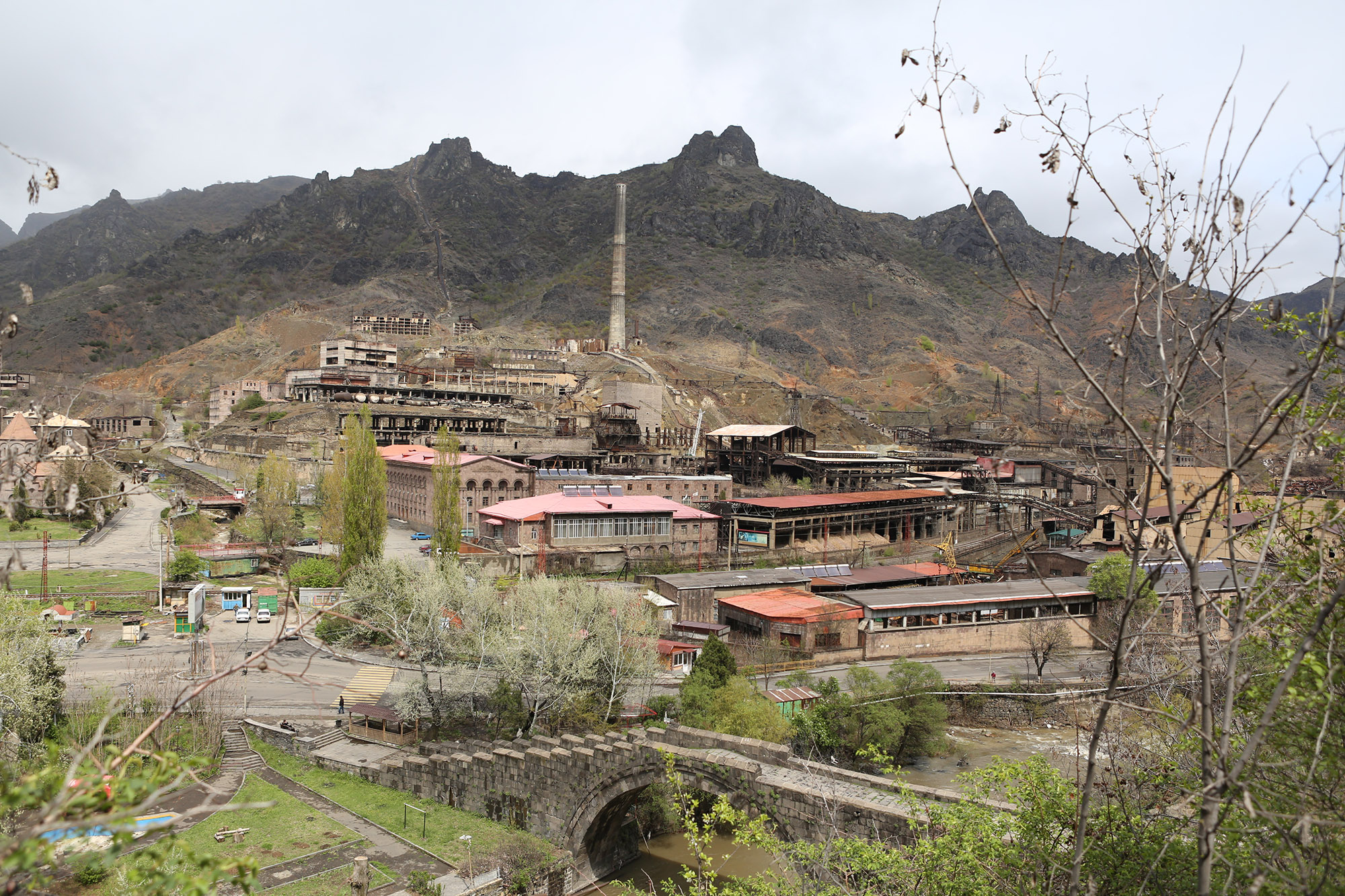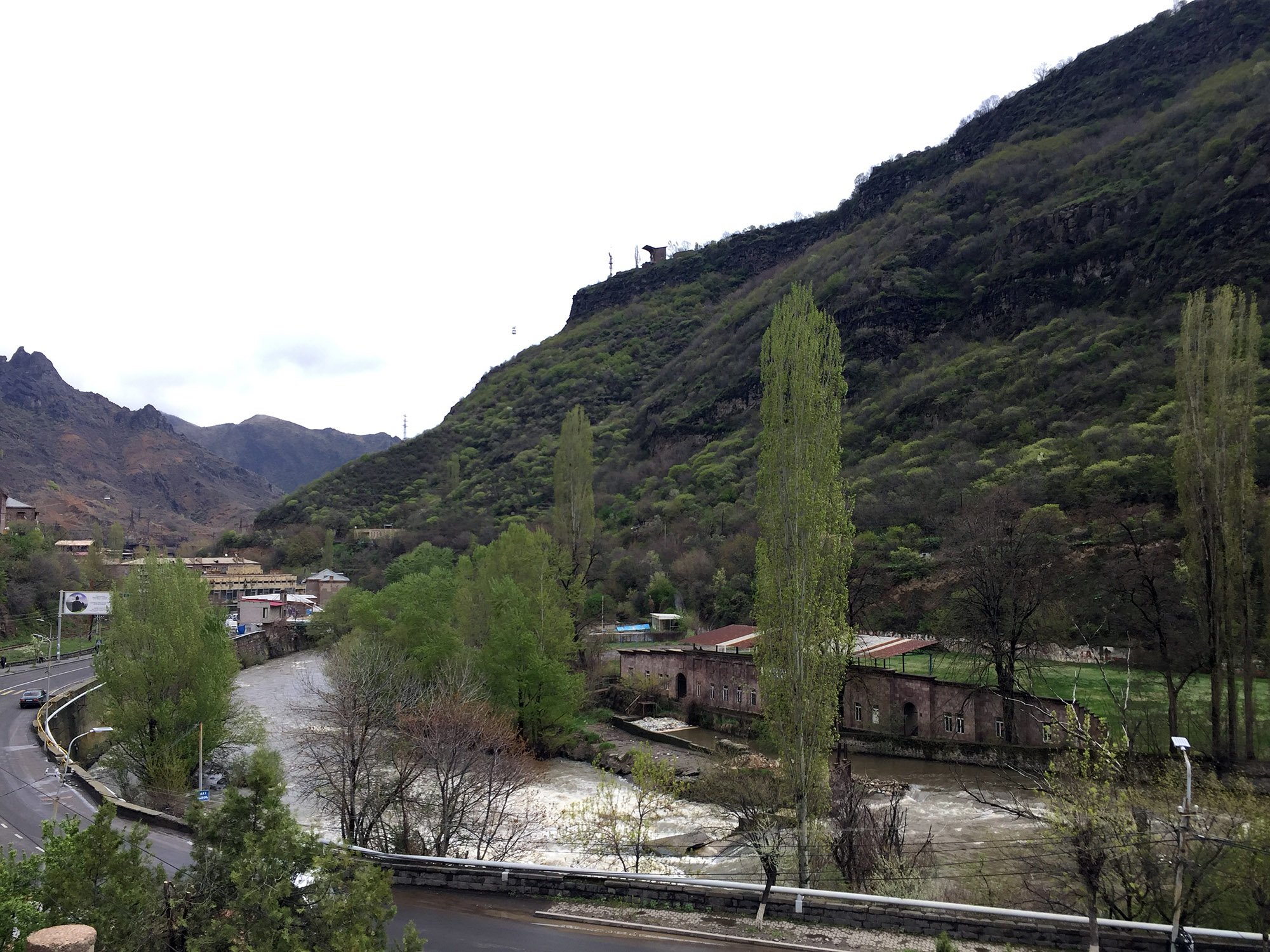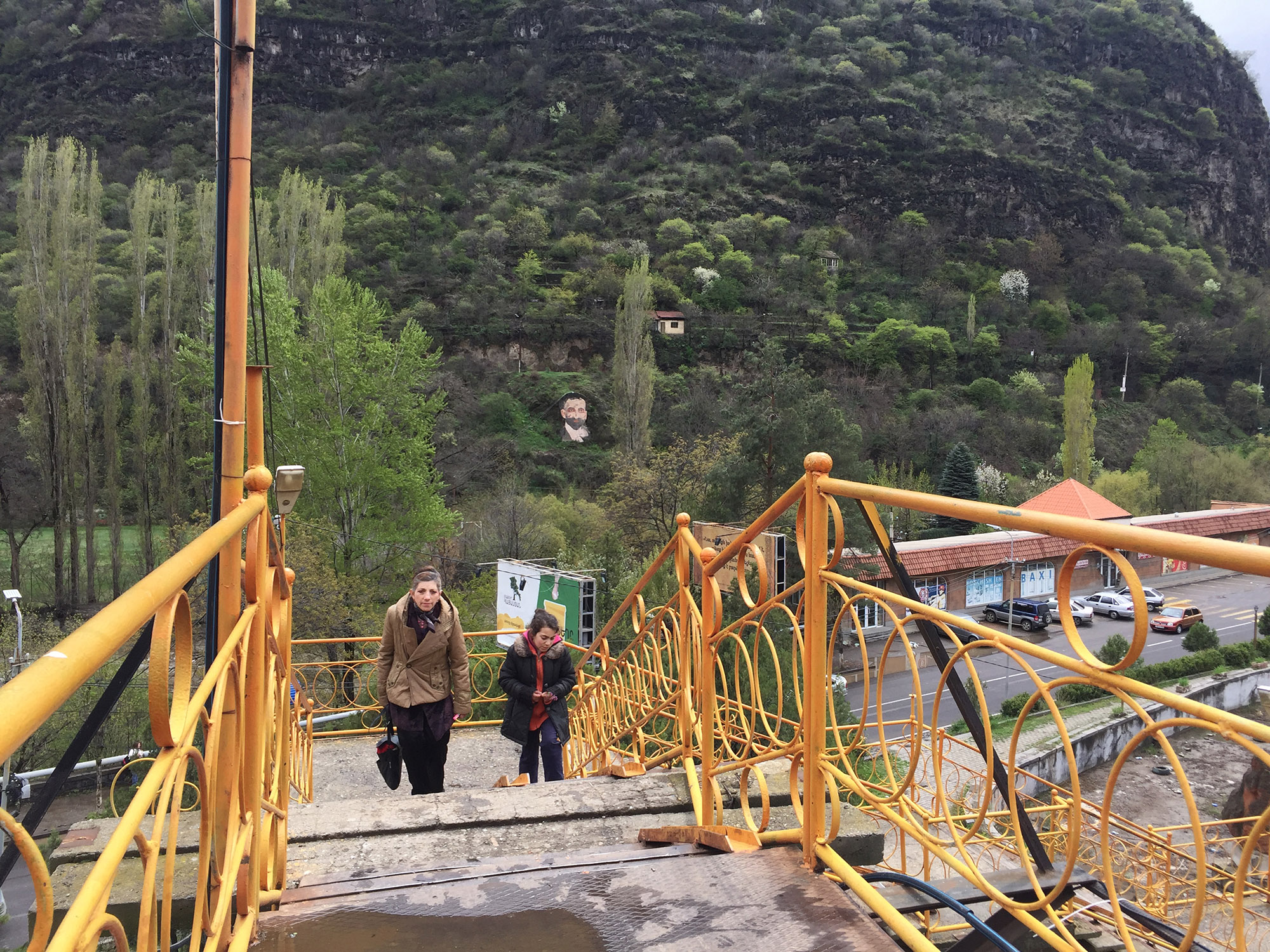

For years the copper smelter was the economic heart of Alaverdi, but its operation came at a price, the plant spewed thousands of tonnes of toxic emissions into the air. Today the smelter’s terrible environmental record finally caught up with it.
Karen Petrosyan, one of the few residents of Alaverdi who is still employed at the smelter, told OC Media that he is one of only 230 remaining employees — less than 2% of the city’s population of 13,000. But despite having the title of ‘employee’, he said, he has not actually worked in months, he is on forced leave.
‘They just keep us around and pay us salaries with the hope that a new plant will be built in the near future and they will need professionals like us’, he said.
Since the smelter’s closure, life in Alaverdi has come to a virtual stop. Every day in the centre of the city, where the majority of shops and markets are located, people — mainly men — gather to discuss what awaits them in the case of a possible, final, closure of the plant.
‘We don’t know how we will continue to support our families’, Karen Sargsyan, a former employee of the smelter told OC Media. ‘Somebody became a taxi driver, somebody started collecting blackberries and raspberries from the woods and selling them in the market, but most of the plant’s employees have already left to go earn a living in Russia’.
‘Eighty to ninety percent of the city is unemployed, except for the plant, there is no other place to work here’, 70-year-old local resident Seyran Tamazyan lamented. ‘If the plant is not operational, there will be no one left.’
‘Nobody comes to the store, I just open and close it’, Armenuhi Abovyan, the owner of a small clothing store in Alaverdi, complained. ‘People don’t have money for food, who will buy clothes?’
Tonnes of pollution
The Alaverdi Smelter, owned by Vallex Group, has been producing 12,000 tonnes of black copper each year for over 60 years.
Oleg Dulgaryan, head of the Centre of Community Mobilisation and Support, a local NGO, told OC Media that the situation with the plant’s emissions worsened in the late 1990s, when the plant switched from producing pure copper to producing copper alloy.
The switch resulted in significant amounts of sulfur dioxide, a toxic pollutant, being released into the atmosphere. In 2017, the plant released 38,000 tonnes of sulfur dioxide into the atmosphere, massively overshooting the legal limit of 5,600 tonnes per year.
In June 2018, at the initiative of Dulgaryan, the ‘SOS Alaverdi’ initiative group was organised in Alaverdi. Its participants regularly held protests demanding to reduce toxic emissions and provide residents with information on the amount of industrial smoke and its impact on human health. The protests stopped after the smelter shut down.
‘No one demanded the closure of the plant’, Dulgaryan told OC Media. ‘But we have the right to know what we are breathing’.
With the change of government in Armenia following the revolution in April 2018, the approach of the state towards environmental problems also changed. Later that same year, after several inspections, the Alaverdi Smelter was fined ֏380 million ($700,000) for violating Armenia’s environmental laws and was legally required to reduce its emissions of sulfur dioxide if it was to continue operating.
The plant was not able to meet this requirement due to outdated equipment.

Lusine Majlumyan, a top manager at the smelter, told reporters in July that upgrading the plant’s equipment is very difficult and inefficient. According to her, a more effective solution would be the construction of a new medium-capacity plant.
She stated that the practical impossibility of fulfilling the requirements prescribed by the environmental inspectorate brings the question of a permanent closure of the Alaverdi Smelter to the top of the agenda.
At the same time, Majlumyan also argued that the plant’s closure is also impossible due to the fact that the property of the enterprise is collateral for a $380 million loan taken out by Vallex Group from VTB Bank in 2014.
The loan was taken in order to finance a large copper-molybdenum mine near the city of Teghut, in Armenia’s Lori Province. The operation of the Teghut mine was suspended in February 2018, following a leak from the mine’s tailings dam into the Shnogh River.
In February, Vallex Group announced that workers at the Alaverdi Smelter would be on forced leave for two months — until the end of December, 2018. The forced leave has since been extended.
On 1 July 2019, the plant’s employees held a protest and blocked the M6 interstate road leading to the Armenian-Georgian border as well as nearby railway lines. Afterward, the government promised to delay the fine and to ‘do everything possible to make the plant operational’.
Illness
Karine Danielyan, president of the Association for Sustainable Human Development, an Armenian non-governmental environmental organisation, told OC Media that the Lori region, where Alaverdi is located, has very serious environmental and health problems.
‘Research commissioned by the United Nations in 2009 show that cases of cancer and blood diseases are more frequent in Alaverdi’, she said. ‘This is no coincidence.’
Serob Nazaretyan, deputy director of the Alaverdi Medical Center, told OC Media that the number of cancer patients registered at the dispensary in the centre has indeed increased. He noted, however, that this was due to a greater number of early cancer diagnoses and not because of pollution.
‘If a few years ago a person lived only a year after the discovery of cancer, now it’s five and a half years, so their number has increased’, he said. ‘This is what gives us the false impression that the number of patients has increased’.
According to him, the smoke from the plant does not reach the villages near Alaverdi, and yet there are more patients from the villages than from the city proper.
Inga Zarafyan, president of Ecolur, an environmental NGO in Armenia, told OC Media that after public outcry, the plant’s chimney — located on the side of large hill overlooking the city — was raised even higher several years ago in order to reduce the amount of emissions that reached the city. However, according to Zarafyan, this failed in limiting Alaverdi’s exposure to the plant’s pollution, and instead just increased the geographic area affected by the pollution.
Serob Nazaretyan told OC Media that the situation in Alaverdi is similar to that of other cities in Armenia. He opposes the closure of the plant, and said he has personally been affected by the plant’s shutdown.
‘Alaverdi’s residents leave the city. My son used to work at the plant, but he doesn’t now. He has a family, children’, Nazaretyan said. ‘How do you imagine me supporting them all by myself?’
Research conducted in 2019 by Arnika, a Czechia-based environmental NGO, has documented high levels of arsenic and cadmium among other heavy metals detected in Lori province. It has also documented the contamination of free-range chicken eggs with dioxin, a carcinogen.
Alternatives?
Sasun Khechumyan, head of the Alaverdi community, told OC Media that since the city has always been an industrial centre, its infrastructure, local programs and development goals have been linked to the smelter.
Oleg Dulgaryan told OC Media that in the near future, an alternative development forum will be held in Alaverdi with the support of the Czech embassy, where projects on new ideas will be developed and funds raised for their implementation.
According to him, state support is very important for an alternative path to development of the region.
Dulgaryan says that even when the smelter is operational it only eases Alaverdi’s unemployment by only 10%, which is not enough to address the full scope of the problem.
‘We need fast, concrete solutions. In my opinion, the best solution would be if the Armenian government declared Alaverdi an area where large investments and projects should be implemented’, Dulgaryan said.
Khechumyan believes that tourism, horticulture and the development of new types of plants can become an alternative development of Alaverdi.
‘We have the largest river in the country, Georgia is next door. Working with Georgia, we can attract tourists. […] We might also attract mountaineering tourists, we just need to develop the infrastructure’, he said.

Dulgaryan noted that the Debed, the province’s largest river, is near a number of major tailings dams and, consequently, is heavily polluted. As a result, he said, agriculture in the region is dying, as local residents use river water to irrigate their crops.
‘Our villages are deprived of almost all agricultural crops. Ecological problems of the region dry gardens and make crops and agricultural products useless’, Dulgaryan lamented.
Vazgen Khachikyan, a former head of the State Social Security Service of the Ministry of Labor and Social Affairs, who lives in Alaverdi, told OC Media that there are many abandoned mines in the region that can be used to develop copper ore tourism.
‘Regardless of whether the plant will be operational or not, it is possible to develop mineral tourism in parallel. There is no need for large investments, the infrastructure itself already exists’, he said.
Khachikyan also proposed the use of abandoned mining tunnels to produce Fontina cheese, which requires the cheese to be kept in cool and humid rooms for several months to mature.
A new plant
During a meeting with the plant workers in February, Armenian Deputy Prime Minister Tigran Avinyan said that the issue of the Alaverdi Copper Smelter is a priority for the government.
‘The Russian VTB Bank and ACP are currently negotiating the further operation of the copper smelter. The government is a mediator in these negotiations’, he said.
Aren Mkrtchan, an MP from the ‘My Step’ faction who was elected in the constituency that includes Alaverdi, said in July that VTB Bank was ready to donate the property complex of the Alaverdi Copper Smelter to the Armenian state for free.
Vallex Group welcomed this move, expressing its willingness to participate in negotiations with the government in order to ‘resume the operation of the enterprise or create new production based on it’.
However, later on, the Armenian government changed its plans on upgrading the plant’s equipment, preferring instead the construction of a new plant in Alaverdi.
In late October, an Armenian delegation arrived in China on an official visit for negotiations with Citic, one of the largest state-owned investment corporations.
Representatives of Citic expressed an interest in constructing a new smelter in Alaverdi, one that would supposedly be equipped with new technologies that would almost completely neutralise emissions.
On 20 November, Tigran Avinyan told journalists that the Alaverdi smelter is environmentally problematic and inefficient, and that the subject of negotiations with the Chinese side has little to do with the existing Alaverdi plant and is instead about building a new plant.
‘The Chinese company is planning a visit to Armenia in accordance with the preliminary agreement’, he said. ‘In general, the construction of a new copper complex is on our agenda’.








